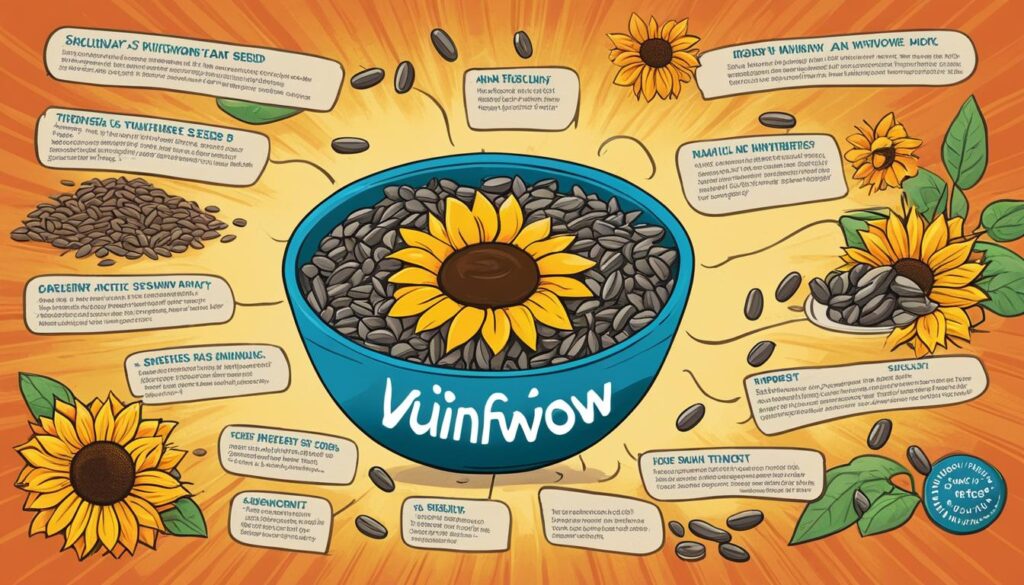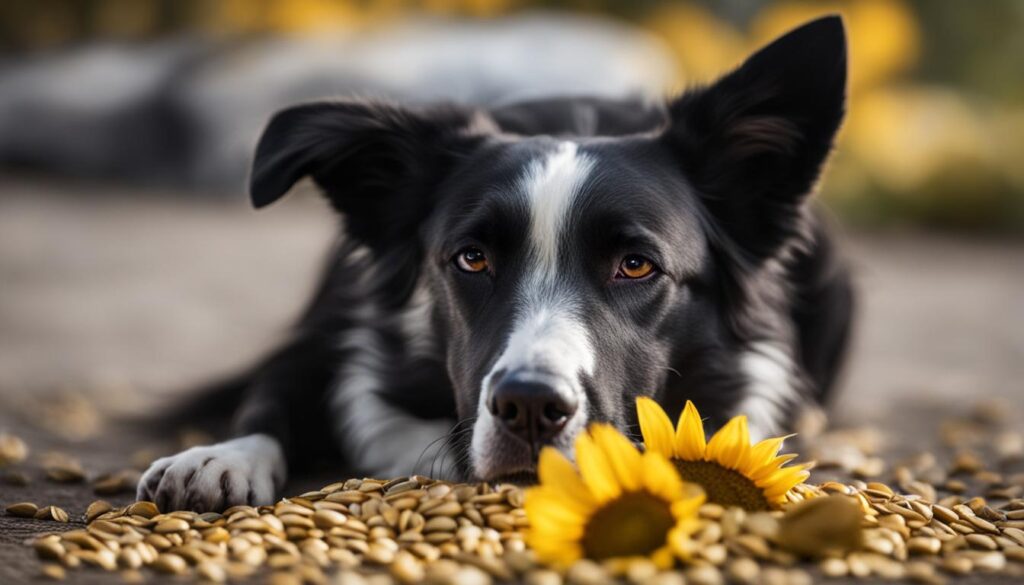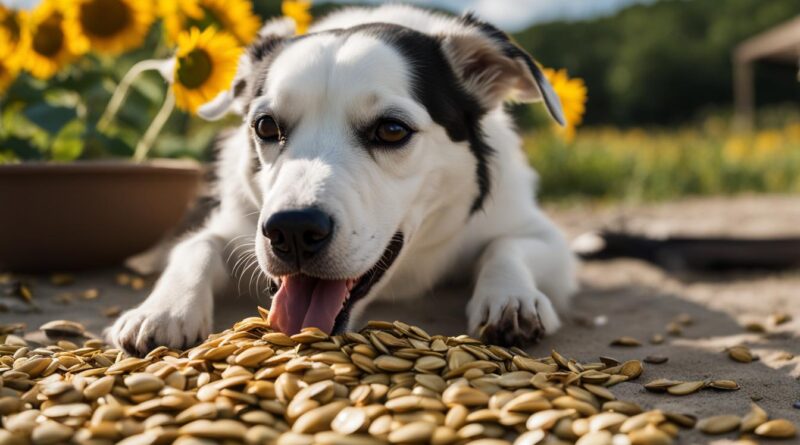Can Dogs Eat Sunflower Seeds? Safety Guide
As pet owners, we often catch ourselves pondering, “can dogs eat sunflower seeds?” It’s a question that bears significance, especially considering the myriad of snacks we humans indulge in and sometimes wish to share with our furry companions. Detailing the safety of sunflower seeds for dogs goes beyond a simple yes or no. While these seeds harbor nutritional benefits, their appropriate inclusion in a dog’s diet is nuanced with considerations for health and safety.
When considering sunflower seeds for dogs, it’s paramount to focus on the natural variety—those free of salt and spices, and most importantly, without the potentially hazardous shells. These little kernels are repositories of protein, fiber, and essential fatty acids, all of which can support the welfare of your pet when administered judiciously. However, steering clear of the risks associated with overconsumption or improper feeding methods is equally vital for maintaining your dog’s health.
Key Takeaways
- Safety first: Offer unsalted, shell-free sunflower seeds to prevent health issues.
- Scrutinize portions: Feed sunflower seeds in moderation in alignment with your dog’s size and dietary needs.
- Recognize the risks: Beware of salt toxicosis and digestive complications that result from improper feeding practices.
- Nourishing qualities: Sunflower seeds are abundant in nutrients supportive of canine coat and skin health.
- Professional advice: Consult with a veterinarian to safely integrate this treat into your dog’s diet.
Understanding the Nutritional Value of Sunflower Seeds for Dogs
Delving into the nutritional offerings of sunflower seeds reveals why many pet owners are curious about the health benefits of sunflower seeds for dogs. Not just a human favorite for snacking, these seeds can also be a boon for your pet’s health when offered appropriately. Let’s unpack the nutritional components that make sunflower seeds a potentially excellent treat for dogs.

Vitamin E and its Benefits for Canine Skin and Coat Health
Sunflower seeds are a powerhouse of Vitamin E, an antioxidant that is pivotal for the maintenance of good skin health in dogs. This vital nutrient aids in forming cell membranes and bolsters the immune system, helping to fight against oxidative stress. For dog owners pondering whether their furry friends can partake in these seeds, the good news is that a smattering of sunflower seeds can contribute to a vibrant, shiny coat and support the overall dermal health of their dog.
The Role of Healthy Fats in a Dog’s Diet
When contemplating the question, “Can dogs have sunflower seeds?” the healthy fats these seeds contain cannot be overlooked. They are abundant in essential fatty acids, which demonstrate marked improvements in the condition of a dog’s skin and coat. A moderate inclusion of these fats in your dog’s diet provides a concentrated source of energy and contributes largely to the nourishment of the skin, ensuring your pet looks as good as they feel.
Essential Minerals Contained in Sunflower Seeds
Beyond fats and vitamins, sunflower seeds for dogs offer a spectrum of minerals that fortify their overall health. Minerals like selenium, copper, and manganese found within these seeds play critical roles. They support several bodily functions from antioxidant defenses to enzyme production. This comprehensive blend of nutrients positions sunflower seeds as a snack that supports holistic canine health when fed in moderation.
- Vitamin E: Antioxidant properties support skin and immune health.
- Healthy Fats: Essential for energy and a gleaming coat.
- Selenium, Copper, Manganese: Vital for a dog’s enzyme function and antioxidant defenses.
Indeed, the inclusion of natural sunflower seeds into a dog’s diet, without additives such as salt, can introduce a range of health benefits for dogs when provided sensibly. As with any treat, understanding portion size and frequency is key to maintaining balance and ensuring that your dog reaps the rewards without any associated risks.
Can Dogs Eat Sunflower Seeds? Debunking Myths and Facts
When the topic arises of what snacks dogs can safely consume, a common query surfaces: “can dogs eat sunflower seeds?” Surrounding this question are numerous myths and misunderstandings that can lead to confusion among pet owners. The reality is that while sunflower seeds aren’t inherently toxic to dogs, they should not form a cornerstone of a dog’s diet. It’s essential to distinguish between the truths and fallacies to ensure the safety and health of our canine friends.
Another vital consideration that usually pops up is, “are snake plants toxic to dogs?” Aside from their diet, knowing what is toxic to dogs extends to our choice of houseplants, and indeed, snake plants are toxic to dogs. It’s an essential reminder that many household items and plants can pose risks, underscoring the importance of vigilance in every aspect of dog care.
Reflecting on past incidents of animal mistreatment, the question is asked, “What did Jordan do to the dog?” Such incidents serve to remind us that our pets rely on us for their well-being and deserve respect and kindness. Similarly, when feeding dogs treats like sunflower seeds, we must practice care and responsibility.
To further clarify the facts, let’s address some key points regarding the inclusion of sunflower seeds in a dog’s diet, dispelling common myths:
| Myth | Fact |
|---|---|
| Sunflower seeds are toxic to dogs. | Unsalted and shell-free sunflower seeds are safe in moderation. |
| A dog can sustain itself on sunflower seeds. | These seeds should be an occasional treat, not a dietary staple. |
| The shells of sunflower seeds pose no risk. | Shells can cause choking or obstruction in dogs and should be removed. |
| All parts of a sunflower are beneficial for dogs. | Only the seed kernels are safe; other parts, such as leaves and stems, could be harmful. |
When in doubt about any aspect of your dog’s diet or surroundings, a prudent approach is to seek professional guidance. A veterinarian can offer the best advice tailored to your pet’s needs. By debunking myths and understanding the facts, we can ensure that our pets enjoy a happy and healthy life.
The Potential Health Benefits of Sunflower Seeds for Your Canine Companion
Exploring the health benefits of sunflower seeds for dogs unveils a plethora of nutritional perks that can positively influence your dog’s health. As owners seek to enhance their pets’ diets with natural, healthful options, it’s worth thoughtfully considering how these seeds can align with dog nutrition. To be sure, these benefits should act as supplements to a well-rounded diet, offering diverse advantages from immune boosts to improved skin conditions.

Boosting Your Dog’s Immunity with Antioxidant-Rich Sunflower Seeds
Rich in antioxidants, particularly Vitamin E, sunflower seeds can play a supportive role in strengthening your canine’s immune system. Antioxidants help to neutralize free radicals, reducing oxidative stress and promoting overall health. Including these seeds as part of your pet’s diet may assist in bolstering their natural defenses, given their capacity to fortify the immune response. Here is a breakdown of the antioxidative components in sunflower seeds:
| Nutrient | Benefit |
|---|---|
| Vitamin E | Enhances immune function and reduces oxidative stress. |
| Selenium | Supports disease resistance and immune health. |
| Copper | Aids in red blood cell formation and immune defense. |
Integrating Sunflower Seeds for Improved Skin and Coat Conditions
Considering whether can dogs have sunflower seeds also revolves around their capacity to enhance skin and coat health. The linoleic acid present in sunflower seeds is a type of polyunsaturated fat that nourishes the skin, aiding in the maintenance of a strong skin barrier, which is essential in combating dryness and flakiness. This essential fatty acid, together with Vitamin E, gives sunflower seeds their reputation for improving coat sheen and supporting supple skin in dogs. Below is a quick look at the skin and coat benefits these seeds offer:
- Vitamin E: Known for its moisturizing properties, keeping skin supple and coats shiny.
- Linoleic Acid: Essential fatty acid that promotes healthy skin and prevents dull coats.
- B Vitamins: Aid in cell growth and repair, contributing to overall skin health.
In sum, the health benefits of sunflower seeds for dogs are evident through their immune-boosting antioxidants and the nutrient-rich profile that supports skin and coat health. However, as with any addition to your dog’s diet, it’s crucial to ensure moderation and proper preparation of these seeds to maximize their positive impact.
Identifying the Risks: When Sunflower Seeds Can Be Harmful to Dogs
While we often consider sharing our snacks with our furry friends, it’s important to be aware of the risks of dogs eating sunflower seeds. Not all human foods are suitable for canines, and even seemingly harmless treats like sunflower seeds can have hidden dangers. Here we’ll explore some of the potential hazards that dog owners should be mindful of.
The Dangers of Salt and Seasonings in Packaged Sunflower Seeds
Packaged sunflower seeds are often seasoned with salt and other flavorings to enhance their taste for human consumption. However, these additives can pose a significant health risk to dogs. Excessive salt intake can lead to salt toxicosis, causing symptoms such as vomiting, diarrhea, lethargy, and even seizures. Therefore, it’s essential to ensure that any sunflower seeds shared with dogs are unseasoned and unsalted.
Choking Hazards: The Perils of Sunflower Seed Shells
Beyond the concern of seasonings, the shells of sunflower seeds represent a choking hazard for our canine companions. The fibrous texture and hardness of the shells make them difficult for dogs to break down and can cause obstructions in their airways. In addition, these shells can get lodged in the digestive tract, potentially leading to blockages that require veterinary attention.
Understanding the Risk of Gastrointestinal Blockages
Gastrointestinal blockages can occur if dogs consume sunflower seed shells, not only causing discomfort but also posing a serious health threat. Blockages can lead to abdominal pain, changes in bowel movements, and can require surgical intervention to correct. Therefore, it’s crucial to offer dogs only shelled, unsalted sunflower seeds.
While sunflower seeds can be a nutritious snack for your pup in moderation, it’s important to consider the portion size and preparation. Here’s a simple table that outlines some safe feeding practices for dogs:
| Treat Type | Suggested Portion | Preparation |
|---|---|---|
| Sunflower Seeds | Small handful per week | Unsalted, shells removed |
| Pepperoni | Not recommended | N/A (High in salt and fat) |
| *Other Human Snacks* | Limited/None | Check with veterinarian |
By being mindful of these concerns, dog owners can make better choices about what snacks to share. While can dogs eat sunflower seeds, taking precautions to avoid can dogs have pepperoni or other harmful snacks, is part of responsible pet ownership. Through vigilance and care, we can ensure our beloved pets stay safe and healthy.

Safe Feeding Practices: How to Introduce Sunflower Seeds to Your Dog
Introducing feeding sunflower seeds to dogs into their diet can be a nutritious treat—if done properly. Ensuring your canine companion enjoys these seeds in a safe manner requires careful consideration. It’s crucial to provide seeds that are shelled and unsalted, and to implement feeding in moderation to align with their size and health requirements.
For those who also wonder “can dogs eat cilantro” and “can dogs eat chickpeas,” similar guidelines of moderation apply. These foods can be safe in small amounts and with careful monitoring for any allergic reactions. As always, consulting your veterinarian for personalized advice tailored to your pet’s specific dietary needs can never be overstated.
When introducing sunflower seeds to your dog, start with these steps:
- Offer the seeds sparingly, and opt for raw or toasted kernels without any salt or seasoning.
- Limit the quantity based on the size of your dog—small breeds can have about 10-20 seeds a week, while larger breeds may have 20-40 seeds. Remember, treats should not exceed 10% of their daily caloric intake.
- Monitor your dog for any signs of discomfort or allergic reactions such as itching, redness, or gastrointestinal upset.
- Schedule a check-up with your vet before regular inclusion of sunflower seeds in your dog’s diet to ensure they’re suitable for your pet.
Feeding practices also extend to other healthy options your dog might enjoy:
- **Cilantro**: A wonderful herb that can be given in small, finely chopped bits as a flavor enhancer in meals.
- **Chickpeas**: These legumes can be safely fed to your pet in cooked, unsalted form as a rich source of protein and fiber.
Always remember, transitioning to any new treat should be gradual and under close observation to accommodate your dog’s acceptance and prevent digestive upset.
| Treat Type | Small Breeds | Large Breeds |
|---|---|---|
| Sunflower Seeds | 10-20 seeds per week | 20-40 seeds per week |
| Cilantro | 1 teaspoon chopped | 1 tablespoon chopped |
| Chickpeas | 1-2 tablespoons cooked | 2-4 tablespoons cooked |
Feeding your dog new treats like sunflower seeds, cilantro, or chickpeas should be a careful, considerate process that enriches their diet without compromising their health. Armed with the right information and consultation with your veterinarian, you can safely introduce these snacks as part of a diverse and balanced diet.

Can Dogs Have Sunflower Seeds in Moderation? Defining Healthy Limits
When pet lovers ponder “can dogs have sunflower seeds,” moderation is the watchword that comes to the forefront of the conversation. Sunflower seeds may offer nutritional benefits to dogs, but as with any treat, the secret lies in balance and understanding the caloric implications. Can dogs eat sunflower seeds in moderation? Indeed, they can, provided pet owners judiciously control portions and take into account their furry friend’s dietary requirements.
Caloric Intake and Weight Management with Seed Treats
Maintaining a healthy weight for dogs involves close monitoring of their caloric intake. Treats, including sunflower seeds, must not exceed the recommended 10% threshold of a dog’s total daily calories. By adhering to this rule, pups can enjoy the occasional sunflower seed treat without the risk of unnecessary weight gain. Moreover, incorporating other nutritious foods like can dogs have chickpeas, offers an alternate route to snack-time variety without skewing total energy intake.
The Importance of Portion Control for Treats
Portion control is critical when sharing human foods with dogs. Knowing how many sunflower seeds a dog can safely consume is as important as knowing if they can eat them. This notion of “portion control” ensures that even the healthiest treats do not disrupt a balanced diet or contribute to potential health concerns such as obesity.
| Treat | Recommended Serving Size |
|---|---|
| Sunflower Seeds (shelled and unsalted) | 1 teaspoon per 10 pounds of body weight per week |
| Chickpeas (cooked and unsalted) | 1-2 tablespoons per 10 pounds of body weight per week |
| Sunflower Butter (natural) | 1/2 teaspoon per 10 pounds of body weight occasional treat |
Clearly, can dogs eat sunflower seeds in moderation is a question with a positive answer, as long as pet parents prioritize measure and mind their canine’s calorie needs.
Are Sunflower Seeds a Safe Treat? Vet-Recommended Guidelines
When it comes to addressing whether sunflower seeds for dogs serve as a safe treat, the consensus among veterinarians is clear—sunflower seeds can indeed be part of a furry friend’s diet but should be introduced carefully. The mainstay of sensible pet nutrition lies in the art of moderation.
Tied to this is an equally important consideration: how we introduce other foods, such as can dogs eat almond butter or can dogs eat butternut squash. Just like sunflower seeds, these foods can offer additional nutritional value when given in the right proportions and under the right conditions.
Before you invite your dog to partake in sunflower seeds, the path of caution calls for a visit to the vet. Quite like how one might check the suitability of almond butter or the nutrient-rich versatility of butternut squash, checking sunflower seeds against your dog’s current health profile ensures that you’re adding to their diet without disrupting their well-being.
| Food Item | Safe for Dogs? | Vet-Recommended Serving |
|---|---|---|
| Sunflower Seeds | Yes, shelled and unsalted | Small handful per week, based on size and activity level |
| Almond Butter | Yes, in minimal amounts | 1 teaspoon as an occasional treat |
| Butternut Squash | Yes, cooked and plain | 1 to 2 tablespoons per serving |
Through careful moderation and vet-approved inclusion of these treats, your four-legged companion can relish the variety without compromising their nutrition. With expert guidance, sunflower seeds for dogs can contribute to their diet in a way that’s both healthful and delightfully satisfying for your pet.
Replacement Foods: Healthier Treat Alternatives to Sunflower Seeds
For pet parents looking to diversify their furry friends’ diet with snacks other than sunflower seeds, there exists a bounty of nutritious alternatives. These snack options not only satisfy the taste buds of your canine companions but also contribute to their daily nutritional needs without the risks that certain human foods pose.
Low-Calorie Fruits as Nutritious Substitutes
Considering a low-calorie treat for your dog? Fruits can be a refreshing alternative bringing sweetness and health to the snack table. For instance, wondering if “can dogs eat eggplant?” The answer is yes; however, only in small, cooked portions to prevent any digestive upset. Another healthy favorite is plantains—just like bananas, “can dogs eat plantains?” Absolutely, but ensure they are ripe and cooked without any added sugars or spices.
- Eggplant: Good in moderation, cooked, and served plain.
- Plantains: Serve cooked and in small quantities for a potassium boost.
Commercial Dog Treats with Balanced Ingredients
When choosing treats for your dog, ready-made commercial dog treats specifically formulated for their dietary requirements can be a convenient and safe option. These treats are designed to balance the dog’s nutrition and cater to a variety of dietary needs or restrictions, presenting a practical alternative to seeds and home-cooked snacks.
| Treat Option | Benefits |
|---|---|
| Commercial Dog Biscuits | Convenient, available in various formulas to fit dietary needs. |
| Fruit-Based Dog Treats | Natural sugars, vitamins, and fiber content for a sweet yet healthy snack. |
| Vegetable-Based Dog Treats | Low in fat and calories; a good source of nutrients without the risks of seeds. |
While exploring different snack options, always remember that although some human foods are tempting to share, not all are safe for dogs. For example, “are snake plants toxic to dogs?” Yes, they are, and thus plants like these should be kept out of reach. Monitoring what our dogs consume—both food and plants—is part of ensuring their safety and well-being.
Conclusion
The journey into understanding the dos and don’ts of canine nutrition leads us to recognize that the answer to “can dogs eat sunflower seeds?” is nuanced. These seeds, when unsalted and shelled, contribute to the nutrient-rich landscape of a dog’s diet, catering specifically to skin and coat health. Although they are not a dietary mainstay, incorporating sunflower seeds in moderation underpins a happy equilibrium between reward and nutrition.
Similarly, the increasing curiosity of pet owners about whether “can dogs eat chickpeas?” or “can dogs have almond butter?” reflects a growing desire to diversify our dogs’ diets with healthful foods. Chickpeas offer protein and fiber, whereas natural almond butter adds a dose of healthy fats—each can complement a dog’s diet when offered judiciously and with a keen eye on portion sizes. In every instance, consistency and moderation are the cornerstone of a diet that bolsters well-being without tipping the scales towards excess.
In fine, as custodians of our four-legged friends’ health, it’s incumbent upon us to proceed with care when introducing any new treats to their diet. Consulting with a veterinarian provides an additional layer of assurance that we are nurturing our pets appropriately. Vigilant observation for any adverse reactions is imperative, ensuring that our canine companions can safely enjoy the variety we offer them. So, as we navigate the plethora of snack options, may we do so with knowledge and a dedication to the health and happiness of our beloved dogs.
FAQ
Can dogs safely consume sunflower seeds?
Yes, dogs can safely consume sunflower seeds as long as they are unsalted, unseasoned, shelled, and offered in moderation as part of a balanced diet.
What nutritional benefits do sunflower seeds offer dogs?
Sunflower seeds provide a source of protein, healthy fats, and dietary fiber. They also contain essential nutrients like Vitamin E, B vitamins, and minerals such as selenium, copper, and manganese that can contribute to a dog’s skin and coat health and overall well-being.
Are sunflower seeds toxic to dogs?
No, sunflower seeds themselves are not toxic to dogs, but they must be shelled and unsalted to avoid potential health risks like choking or salt toxicosis.
How can sunflower seeds benefit a dog’s skin and coat?
The Vitamin E and healthy fats in sunflower seeds can promote a glossy coat and healthy skin in dogs by supporting cell membranes and offering antioxidant properties that protect skin health.
What are the risks associated with feeding dogs sunflower seeds?
The risks include choking on the shells, digestive blockages from unchewed shells, and salt toxicosis from consuming salted sunflower seeds. Additionally, over-consumption can lead to weight gain and stomach upset, particularly in dogs with sensitive stomachs or pancreatitis.
How should sunflower seeds be introduced to a dog’s diet?
Introduce sunflower seeds gradually, ensuring they are shelled and unsalted. Start with a small amount and observe the dog for any adverse reactions or allergies. For small dog breeds, around ten to twenty seeds per week are adequate, while larger dogs can be given twenty to forty seeds.
What constitutes a moderate amount of sunflower seeds for dogs?
A moderate amount of sunflower seeds would be a small quantity that doesn’t exceed 10% of a dog’s daily caloric intake. This ensures the seeds are used as a treat and not as a meal substitute, which helps prevent unintentional weight gain.
Is it important to consult a vet before giving sunflower seeds to dogs?
Yes, it’s always best to consult with a vet before introducing any new food to your dog’s diet. A vet can provide guidance on proper serving sizes and ensure that sunflower seeds are suitable given your dog’s health history and dietary needs.
Can I offer fruits instead of sunflower seeds as treats for my dog?
Absolutely. Low-calorie fruits such as apple slices (without seeds) and berries can be great alternatives to sunflower seeds, offering vitamins and hydration without the risks associated with the seeds.
Are there commercial dog treats that are healthier alternatives to sunflower seeds?
Yes, many commercial dog treats are formulated to meet canine nutritional requirements. Look for high-quality treats with balanced ingredients, keeping an eye out for any additives or excessive calories.


